How retired AFL premiership coach Denis Pagan turned a stint in horse training into a fairytale
Coach Denis Pagan came out of retirement to turn his hand to horse training and after just 12 starts he snatched a fairytale triumph. Here’s how he achieved the dream, writes Andrew Rule.
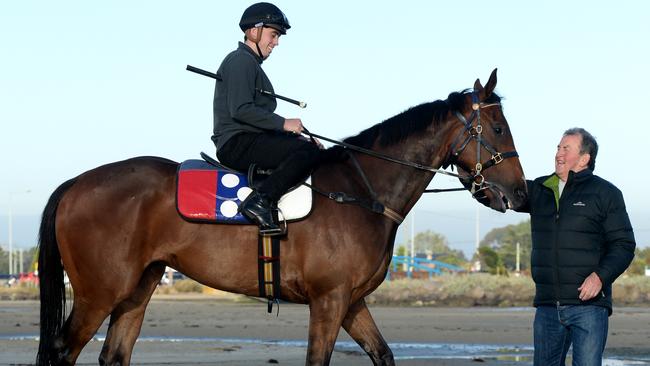
Andrew Rule
Don't miss out on the headlines from Andrew Rule. Followed categories will be added to My News.
When Denis Pagan was a teenager, coins came in shillings and pence, the new
US President was John F. Kennedy and a drummerless backyard band in Liverpool called “the Beatals” was auditioning a bass player named Sutcliffe.
Back in that foreign country of 1962, a catchy pop hit was “Johnny Get Angry”, sung by Joanie Sommers.
The lyrics stuck in Pagan’s mind as songs do when you’re young. Which is why, 58 years later, the handy VFL player who became an outstanding AFL premiership coach recalled the song title to name a horse.
Not any horse, as it turns out. Johnny Get Angry is the big, angular, awkward-looking youngster that has just turned Pagan into a poster boy for the third age — the one that starts when you officially retire.
If you’re lucky, life plays out in three acts. The curtain drops after the third. Some rage against the dying of the light but a lot more play bowls or golf and go fishing. Others perfect the arts of gardening, lawn-mowing, car-washing and minding grandkids.
The intellectually restless might make up the gaps in their education and take courses or scratch an itch for genealogy or photography. Some squabble over crosswords and Scrabble.
Not Denis Pagan. When he turned 70 three years ago, he was determined to transform himself into a horse trainer. Determined is a stronger word than dreamed.
He wasn’t going to settle for playing around with a slow “picnic horse” and a fat Labrador on a hobby farm in the country, tempting as that might seem to some. No, the dual premiership coach was set on training from Flemington, alongside the greatest names of the Australian turf on one of the world’s great racecourses.
Johnny Get Angry wins the AAMI Victoria Derby! And it's an outstanding sporting double for Denis Pagan! #DerbyDay #MelbCupCarnival pic.twitter.com/57g8Z6JMQX
— 10 Sport (@10SportAU) October 31, 2020
How Pagan overcame official inertia to do that is a story in itself — it has taken three years and the support of one open-minded official to make his ambition a reality.
Luckily for racing, the dead hand of bureaucracy, the headshakers and knockers, didn’t get their way. If the naysayers had blocked him so long that he had given up, it would have choked one of racing’s few bright stories at a time when bad news drowns out the good all too often.
When Johnny Get Angry galumphed to the lead to win the Victoria Derby for Pagan last Saturday, like a raw, teenage ruckman running through midfielders, it was the best story of the COVID spring carnival’s weeks of ghost meetings.
“Johnny” is big and still green but he’s still a baby — a late foal, he doesn’t turn three by the calendar until next week — and won at only his seventh start. Even better, he was ridden by a fresh-faced apprentice, Lachie King, son of admired Melbourne Cup-winning jockey Steven King.
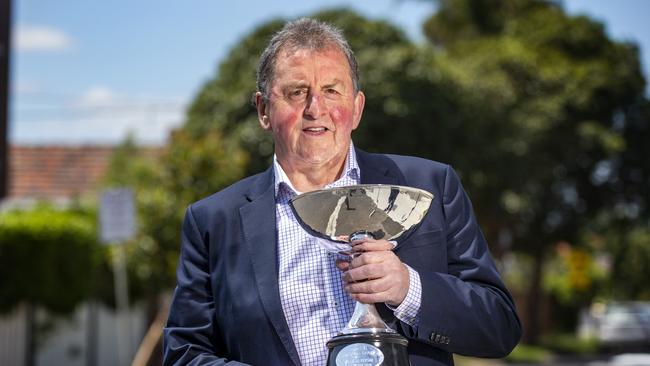
King junior is one of Gerald Egan’s limited edition handmade jockeys, built and polished at the Mansfield picnic racecourse in the mountains. Egan, who came to horse training via horse breaking and stunt work, has produced several Group 1-winning jockeys from limited numbers. One of them is Jye McNeil, who won the Melbourne Cup three days after King’s Derby win.
Egan recalls with slight amusement how the authorities didn’t allow him to take on apprentices, curling the lip at a “horse breaker” being entrusted with their welfare. Luckily, Egan and common sense prevailed over the desk jockeys, and he has since stamped himself as probably the most successful “coach” of gun race riders in the world. Apart from King and McNeil, he taught Black Caviar’s rider Luke Nolen, the Caulfield Cup-winning Nick Hall, and Gerald’s talented nephew Billy Egan.
The Saturday we call Derby Day in the nation’s sporting capital is hailed the finest day’s racing in the southern hemisphere, which puts it among the world’s biggest sports and social events. Every race on the card is a Group race, four of them Group 1.
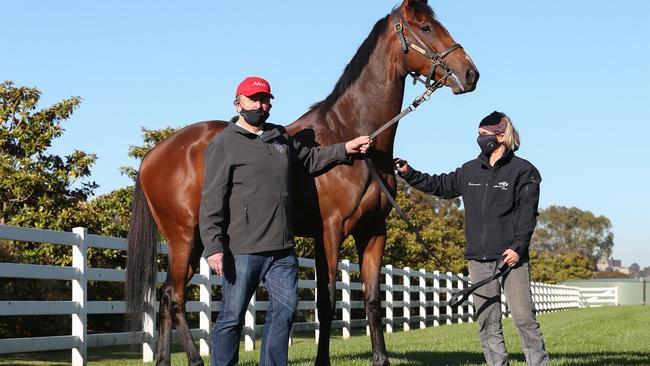
The race itself is the oldest classic in Victoria, the VRC Derby, run every
year since 1855, six years before the first Melbourne Cup.
Before last Saturday, only three “maidens” (non-winners) had won the Derby since it began in 1855.
“Johnny”, as his friends call him, is the fourth. Landing his sole owner more than a million dollars in the process.
As a story, the rise of the big horse, the old coach and the kid has more going for it than the fact a multi-millionaire recluse wins yet another Melbourne Cup with yet another imported stayer whose name the public didn’t know a month ago and won’t care about in another month.
Instead, we have lasting images of the tough-as-nails footy coach choked up as the apprentice (the one he insisted keep the Derby ride) brings the horse back to scale.
There’s a little bit of “Rocky” in the story of Johnny, Lachie and Denis.
In the song, the singer wants her man to get angry. Pagan was not all sweetness and light as a footballer and a coach, but any anger he showed was probably as much calculated tactic as overwhelming rage.
Don’t get angry, get even. Try harder.
Think of a better way. That was more his
thing.
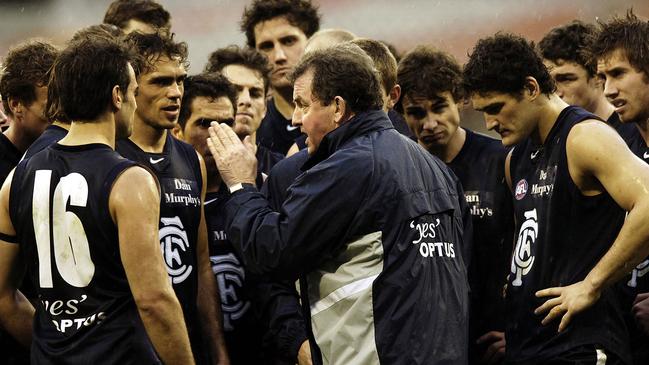
When Pagan started playing football, nursing an attitude like that helped turn players like him into successful defenders on the field and off it.
He stopped playing the game when his body and his coaches told him to, in 1976. Three decades later, a time which included taking teams into finals 18 years straight, he stopped coaching, too. But his attitude? That stuck.
So did the urge to teach and to train, to achieve goals and solve problems by constantly tuning the mix of exercise and discipline, routine
and rest.
When Pagan started training horses, officially less than five months ago, he struck a blow for everyone passing the conventional retiring age and heading into “grandparent” territory, the eighth decade.
His first winner came quickly. That was when Frankie Two Angels won a two-year-old race at Sandown in July: a city winner, off the bat. Owner-trainers go all their lives without doing that, but Pagan had a plan mapped out before finally being granted his restricted licence in June.
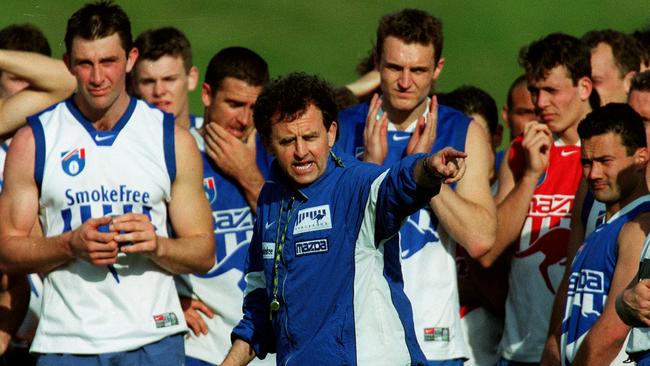
The owner-trainer licence restricts holders to training only horses they own themselves. Pagan couldn’t even have his wife Cheryl in
the ownership of their horses if he trained them, one of those petty rules of racing that irritate the hell out of the people who pay for the party.
Pagan worked out early that in sport, as in life itself, talent is often squandered by those who are born with it. Talent can’t be faked, but in everything from ballet to boxing, it needs those reliable teammates, determination and desire, to get anywhere.
As a clear thinker, the young Pagan grasped what was needed for him to make it in football. He saw that grit mattered as much as “gift”. He and certain other defenders studied their gifted opponents so keenly that the process turned them into tactical coaches.
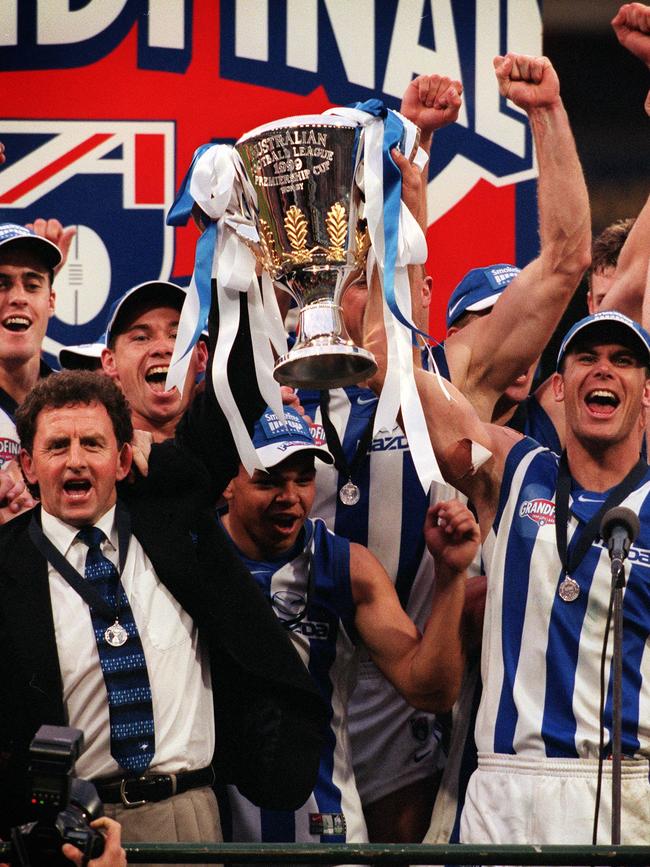
Like Hafey, like Sheedy, Malthouse and Parkin, Pagan is one of the quintessential back pocket players who climbed the greasy pole to be a premiership coach. He also scored five Under-19s and one reserves flag in a 40-year career that saw him retire as one of the game’s most decorated coaches in 2007.
A coach must inspire loyalty, trust and affection in a team — yet stand far enough apart to instil respect and authority. To be a professional coach can be the loneliest profession of all. Only a certain type handles it.
Denis Pagan is the type. Contemporaries recall how deftly he managed under-age sides to win the finals games that got him back into the big league, where he had played 143 games (120 with North Melbourne) and represented Victoria.
Football was his business. But racing was more like love. Maybe it caught him on the rebound? He doesn’t make the connection himself but here’s an interesting thing: a few weeks after he played his last league game in 1976, he went to the Caulfield Cup. He put a bet on How Now, couldn’t believe how good he felt when she won.
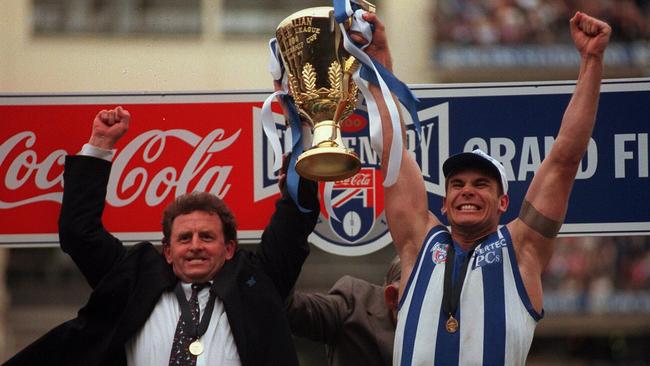
The better coaching jobs that Pagan got, the more he could afford to race a horse or two. He started with Lee Hope at Kilmore. Later, he had horses at Flemington with John Sadler, and met Troy Corstens when Sadler and Corstens formed their Malua racing partnership.
Pagan has stayed close to both Corstens and Sadler, who are as wise about horseflesh as Pagan is about football. He soaked up knowledge from them and they inducted him into the group of wise heads who wit in the Flemington trainers’ tower.
Corstens’ record at selecting yearlings is remarkable. He has inspected youngsters for Pagan for years, all part of the coach’s quest to find a Derby horse.
Which was why they were at the Karaka yearling sales together in January last year. Pagan the organised clipboard man with a
well-thumbed, neatly notated catalogue, dozens of pages earmarked; Corstens with a keen eye.
Corstens looked at Pagan’s paddock of heads and legs and pruned the list to a handful. When bidding started, the chosen ones all went too high for Pagan’s budget.
Cheapest of them was the tall, gangly colt by Tavistock from a Zabeel mare, Luminova, passed in for $80,000. He’d grown centimetres in the month before the sale and looked plain gawky compared with the primped and pumped-up colts on show.
The seller, Casey Dando of Bradbury Park, wanted $100,000. A family newspaper cannot repeat what he said to Corstens after grimly agreeing to do a deal for Pagan’s limit … $50,000.
One reason Pagan got the horse at his price is that he was so tall and “unfinished”. A work in progress. He still is, which is why the canny coach put him on a truck four days after the Derby win, and sent him to Corstens’ farm for
a spell.
The public won’t see him again until the interstate Derbies in autumn. By then, he might have almost finished growing. After that, who knows? Cups are not out of the question. If not next spring, then 2022.
The third age is nowhere near the last act for Denis Pagan. For him, it’s only the premiership quarter, with a fourth coming up.
Watch out for more song titles in the form guide, now he has a budget to buy horses.
If you see one named Yesterday’s Hero,
back it.
MORE RULE:

